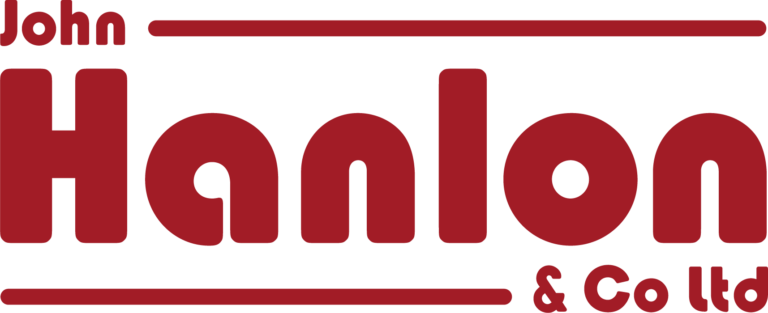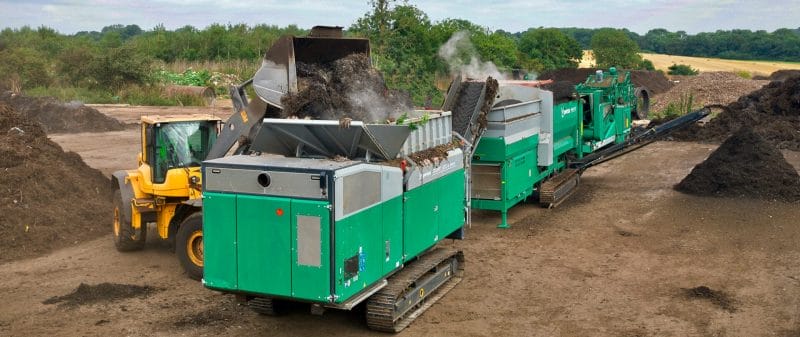Cumberlow Composting Services director James Hodge describes the evolution and innovation that the partnership with Komptech/John Hanlon & Co Ltd has enabled at his family business.
The UK composting industry has become much more sophisticated over the last 20 years, with improvements in techniques and equipment, as well as the increasing demands of legislation. This transformation is no better illustrated than by Cumberlow Composting.
The Hertfordshire-based organics reprocessor is situated on a farm that the same family has managed for three generations. Today, the business is run by brothers James and Henry Hodge, developing the open windrow site established by their father David in 1995 – originally a pilot scheme to take 1000 tonnes a year of green waste from North and East Hertfordshire District Councils.
This grew as the local authorities expanded their collections, and by 2006 the operation at Cumberlow Green Farm was handling 25,000 tonnes of green waste, having developed its process to meet PAS100 specifications for the compost produced.
The following year, Hertfordshire County Council awarded a long-term contract to Cumberlow Compost Services to dispose of comingled kitchen and garden waste. In turn, prompting further investment in the operation and the introduction of an in-vessel composting (IVC) system to meet the Animal By-Products Regulations (ABPR).
As the operation has scaled up, inevitably so has the equipment required to process the material. Today, the site is permitted to take 40,000 tonnes a year, of which 30,000 comes from the Hertfordshire councils comingled collection, with the remaining 10,000 tonnes from local businesses handling green waste that goes directly to open windrow.
“When ABPR waste arrives on the dust carts, it goes over the weighbridge and then into a reception building,” James Hodge, one of Cumberlow’s directors, explains. “From there, the comingled materials go through a two-barrier clamp system with retractable roofs and an underground aeration tunnel [the IVC]. After it’s been in there for four days above 60°C, it’s been sanitised and goes onto the maturation pad.”
Cumberlow then sends samples of the material for analysis to check for e.coli and salmonella. When the lab confirms that the pathogens have been killed, the commingled material is mixed with green waste outdoors and shredded for windrow composting.
A recent step forward for the business was acquiring a Komptech Crambo 5200D shredder last year. “We used a Williband high-speed shredder for the first 20 years, which was good. It did a good fine shot, but the problem with high-speed shredders is if you get a bit of metal or concrete, something it doesn’t like, it just breaks the machine,” says Hodge.
“My engineer likes Komptech, and then Hanlons [John Hanlon & Co Limited, which manages the UK dealership for Komptech] arranged a trial with the Crambo. Based on our tonnage throughput, they recommended the size. They brought it to the site and left it here for a few days.”
The team at Cumberlow Composting was persuaded: “They describe this as a slow speed, but it’s more medium speed. The slow speed doesn’t necessarily mean it’s any slower. It’s the way it shreds. On this machine, if something goes in it doesn’t like, it reverses and gradually takes it through and the machine doesn’t break. They’re longer-lasting, with less wear and tear on the parts. And as for things like tree stumps, big bits of wood, it just doesn’t struggle with them.” Like a higspeed would.
This capability of shredding a wide range of material to different sizes makes the Crambo 5200 operationally significant for Cumberlow, as the feedstock varies throughout the year, ranging from ‘hedges and branches in winter to more grass cuttings in spring and summer and leaves in autumn. Being able to change the basket size on the Crambo means the business can efficiently manage the product being produced and throughput.
After shredding the combined wastes, the material is windrowed for seven weeks. The resulting compost goes through a 25mm screen and a 10mm screen. Fines from the latter sell under Cumberlow’s brand name ‘Ace of Herts’. The 25mm grade is made freely available to local farmers to collect from the storage pad on site.
Screens and separation
James Hodge recalls that the first piece of Komptech equipment that Cumberlow purchased in 2005 was a secondhand Mustang screen, which at the time had done 12,000 hours.
Although it’s now done 20,000, it’s still going strong today, comments Hodge. “We still keep it, even though it’s about 20 years old, as a back up machine, as It’s quite simple,parts readily available and it’s so easy to repair.”
Recently, at a similar time to upgrading their shredder, the Herts-based composter went through procurement of a new drum screen, opting for a Komptech Nemus. “Again, John Hanlon brought us a demo model. We just thought it was amazing from day one. You can change a product with so many more alterations that you couldn’t do on the previous model or other competitors. On most screeners, the drums are 180 degrees – horizontal. With this, the chassis is hydraulically adjustable, so you can lift and tilt the screen. It has many more variations to get a better product.”
The ability to regulate the proportion of fines and oversize isn’t the only
feature of the Nemus that James Hodge is pleased about: “It’s on tracks, which is much more versatile. It’s more mobile. It’s a lot quieter, as is the Crambo. You can barely hear it even when they’re working together. So that makes a difference for us.”
His biggest concern was the cost. As was also the case with the Crambo, Hodge was unsure whether Cumberlow Composting could afford the Nemus. In both cases, John Hanlon structured a package ‘that just worked’ within their cash flow constraints.
It’s a partnership that Hodge is quick to praise for other reasons. “The guys at Hanlon’s know what they are talking about. Their backup is brilliant. They work really well with my engineer as well. We just got a part of the Crambo that we needed, which they flew over from Germany within 24 hours, despite Brexit and COVID.”
Unlike many reprocessors taking organic waste from local authorities, contamination is not a major problem for Cumberlow. James Hodge attributes this to the local demographics, houses with bigger gardens and a good level of understanding by the public using the area’s green and kitchen waste services.
A key factor in reducing contamination and managing the quality of the oversize has been the role of the Hurrikan windsifter. The separator was the brothers first direct purchase from Komptech (in 2010) when the operation expanded to take in more waste from East Herts. It has since been sold on and replaced with a Hurrikan S (dual fan) in 2015. According to Hodge, the Komptech separator requires no demo: “Word of mouth is the Hurrikan, or the Hurrikan S is the best in the industry. The windsifter is pretty good at taking out the plastics. If they’re not handpicked out, they get taken out through the Hurrikan. It’s got a stone trap and a metal trap, which work well. So the product that comes out is really clean.”
Testing a single pass process
Cumberlow Composting has been running trials with a new method using its Komptech machinery, which processes material in a single pass after the ABPR waste has gone through the IVC and mixed with the green waste before windrowing it.
“We put this into the Crambo, then the Crambo feeds into the screener, and then the screener feeds into the Hurrikan S (as it always did anyway),” explains Hodge.
“So we get our fines coming out one side, the 25mm or 10mm, and then in the back, we get the oversize, which we then process. It’s a good quality product, and we’re not double handling. We don’t have to load up the shredder, then move the waste, put it in a windrow, then move that waste again through a screener and separator.”
It means there is hardly any contamination at the start of the outdoor composting stage: “As it comes out, the windrows all look really clean, other than it hasn’t finished its seven weeks it’s good to go. So when someone comes out, that pad looks amazing. You don’t see any plastic.”
Although Cumberlow’s tests have shown this technique works best in drier conditions, the expected cost-benefit means that the business plans to switch its process over to this for the next PAS100 assessment.
“Upfront, it’ll be a bit slower doing it this way, but you’re saving time in the long run. Plus, there’s less fuel cost, less manpower. I think some sites won’t like this; the foreman will see it only takes one person to do this job that previously needed two or three and say, `We don’t want it to work. Otherwise, we’re going to be redundant.’”
As Cumberlow Composting continues to grow its operation, James Hodge notes that the reliable partnership with John Hanlon & Co/Komptech GB makes a big difference: “It’s not just about the equipment, it’s about the service, because if these machines are down for any period, it causes massive problems, And they do break down, even the best ones, but it’s about getting it back up and running as soon as possible, and they are there in 24 hours, and if they can’t get it repaired they’ll get you a new one.
“In the 20 years that I’ve been in waste, this has been the best supplier relationship I’ve had. It helps that their equipment is the best as well.”

